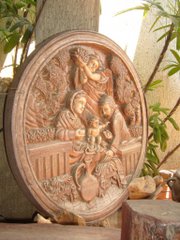I'd like to pretend for the next 15 minutes that my day went well. The operative word being... "pretend".
So I've finally finished watching, after many previous unsuccessful attempts, wait for it..... the play: "The Last Days of Judas Iscariot".
It was quite riveting, provided I only saw a youtube cam version of said broadway play. Judas Iscariot, trapped in purgatory, was tried for his act of betrayal and suicide. Several witnesses were called to the stand, his own mother, then there was Mother Teresa, Sigmund Freud, Caiaphas the Elder, Pontius Pilate, and of course the big guy himself, Satan. Yes, they all had something to say about Iscariot's humanity, or lack of it.
How brutally cruel was the world to Iscariot? Very. No wonder he was driven mad by the pain of his guilt, after all he betrayed his friend, the other big guy, JC. But without that betrayal, there would have been no judgement by Pontius Pilate, no crucifixion, no coming into glory. Would anybody really trade places with Iscariot? Would anybody really like to take his place on the star team 12? Sure, Peter, Matthew, even Mary Magdalene had it all easy. Their sacrifices were acknowledged, they were always on the good. They never had to live with the pain of guilt.
Then there's Iscariot, who we only remember for being cruel, we forget his humanity. We forget that he had a role to take, that maybe no one else was strong enough to be burdened by.
It was the ending that did it for me, it was riveting.... how the final showdown between Jesus and Iscariot went down. Iscariot was so lost in guilt, so trapped in his pain that he refuses to hear what Jesus was saying to him, how he truly felt, how much he loved him. And Iscariot, annoyed by his own destruction, and enraged by a madness, faded slowly and figuratively died once more, this time in the arms of his friend, Jesus. And then he washes his feet, humbling himself once more, making him more God than human, and at the same time, more human than anyone.
Every villain has a backstory worth listening to, every madness is rooted in the dischord of humanity.
We grow up hearing stories of the prince charming saving the beautiful princess from the evil witch. In childhood, we always root for the obvious hero, the gallant knight, the eloquent savior. In adulthood, we begin to see that the evil witch has her own story to tell, that the villain's life is more interesting, more captivating, more relatable as we go about our daily lives in the largely imperfect world. Humanity drives us to believe that the villain, the unlikely hero, is the more interesting character, the one we ought to reserve our claps for.
I'm also a fan of "Wicked", the story of the Wicked witch of the West as portrayed in the story of the Wizard of Oz. It is so easy to hate a vengeful, green witch with pointy tooth and a history of violence. And yet I was captivated by the story of this little green-skinned girl who grows up in a politically-unstable world. She is thrust into the fight against racial issues, and forced into reclusion in her latter years as her plight for equality is misunderstood.
The teartracks of those pained by life are battle scars that form the madness.
Wednesday, February 16, 2011
Subscribe to:
Post Comments (Atom)













No comments:
Post a Comment